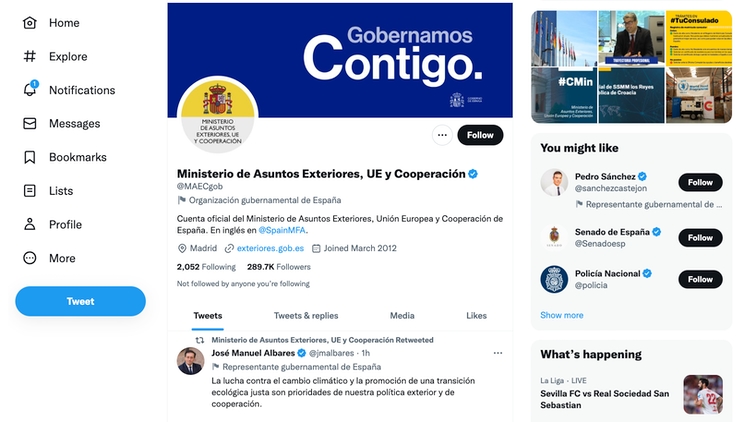The Diplomat
The Ministry of Foreign Affairs, European Union and Cooperation has outsourced the management of its various social networks over the next two years to the company Eurostar Media Group for almost 150,000 euros, with the aim of increasing “Spain’s notoriety on an international level” and “increasing awareness of Spanish foreign policy”.
This is stated in the formalisation of the contract, to which Europa Press had access, which specifies that the Foreign Ministry will allocate 149,121.56 euros, including taxes. In total, the department headed by José Manuel Albares received two bids and “the most advantageous” was chosen. The contract could be extended a maximum of two times, for one year each.
Until 1 November, when the contract came into force, the Ministry’s social networks on Twitter, Facebook, Instagram and YouTube depended on the Directorate-General for Communication, Public Diplomacy and Networks, but now the company awarded the contract will be in charge of managing them, based on the communication strategy set by the Directorate-General for Communication, Public Diplomacy and Networks.
Specifically, the Foreign Ministry has a Facebook profile, three on Twitter (@SpainMFA (in English), @MAECgob (in Spanish) and @jmalbares), two on Instagram (exteriores.maec and jmalbares), one on Linkedin (that of the current minister), as well as a YouTube channel.
In addition, the Embassies, Consulates and Permanent Representations have “a wide range of profiles on social networks”, which are managed by each of them, but now they will have the support of the company awarded the contract, which will be responsible for “coordinating the communication policy” with them, providing “advice and monitoring” of their accounts.
Eurostar will have to propose a content management application that will make it possible to visualise a calendar of published and planned content and events; a content search engine; the top most successful content; documentation such as manuals and style guides; administration of user permissions; and a scorecard. It will also have to “obtain feedback from users” and pass it on to the Communications Department, as well as submit monthly reports on activity and results.
The contract specifications establish a series of minimum publications depending on the social network. Thus, for Facebook, a minimum of five daily posts is foreseen, while in the case of Twitter there will be a minimum of nine in the English and Spanish profiles. As for Instagram and LinkedIn, there will be at least one post per day. All of this content will be made available to diplomatic missions.
The aim of all of this is, firstly, to increase Spain’s international visibility, as well as that of the Ministry, in addition to increasing awareness of Spanish foreign policy and the consular services provided by the Ministry.
On the other hand, the aim is to respond to requests for information on the Ministry’s activities received through social networks, as well as to take advantage of the possibilities for interaction offered by social networks to “generate greater empathy and identification with Spain”.
In order to carry out this task, the Foreign Ministry proposes that a team of at least three people – an account director and two community managers – is needed, who are required to be bilingual in Spanish and English. The requirement for fluency in English is justified “by the need for maximum projection and dissemination of information” in the international arena through accounts in this language.
The two community managers will have to work exclusively for the duration of the contract and their substitution or change must be previously authorised by the Ministry’s Communication Department.







